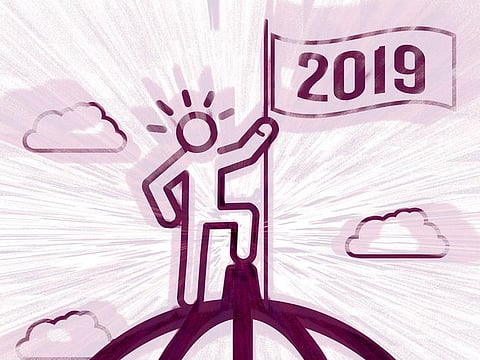2019 was the best year in human history. Here is why
Illiteracy, extreme poverty may be eliminated soon. There's no bigger triumph on our watch

HIGHLIGHTS
Illiteracy and extreme poverty may be eliminated soon. There's no better triumph on our watch
If you’re depressed by the state of the world, let me toss out an idea: In the long arc of human history, 2019 has been the best year ever.
The bad things that you fret about are true. But it’s also true that since modern humans emerged about 200,000 years ago, 2019 was probably the year in which children were least likely to die, adults were least likely to be illiterate and people were least likely to suffer excruciating and disfiguring diseases.
Every single day in recent years, another 325,000 people got their first access to electricity. Each day, more than 200,000 got piped water for the first time. And some 650,000 went online for the first time, every single day.
Perhaps the greatest calamity for anyone is to lose a child. That used to be common: Historically, almost half of all humans died in childhood. As recently as 1950, 27 per cent of all children still died by age 15. Now that figure has dropped to about 4 per cent.
When I was born in 1959, a majority of the world’s population had always been illiterate and lived in extreme poverty. By the time I die, illiteracy and extreme poverty may be almost eliminated — and it’s difficult to imagine a greater triumph for humanity on our watch.Nicholas Kristof, American journalist
“If you were given the opportunity to choose the time you were born in, it’d be pretty risky to choose a time in any of the thousands of generations in the past,” noted Max Roser, an Oxford University economist who runs the Our World in Data website. “Almost everyone lived in poverty, hunger was widespread and famines common.”
But but but President Donald Trump! But climate change! War in Yemen! Starvation in Venezuela! Risk of nuclear war with North Korea.
All of those are important concerns. Yet I fear that the news media and the humanitarian world focus so relentlessly on the bad news that we leave the public believing that every trend is going in the wrong direction. A majority of people say in polls that the share of the world population living in poverty is increasing — yet one of the trends of the last 50 years has been a huge reduction in global poverty. As recently as 1981, 42 per cent of the planet’s population endured “extreme poverty”, defined by the United Nations as living on less than about $2 a day. That portion has plunged to less than 10 per cent of the world’s population now.
Diseases on the decline
Diseases such as polio, leprosy, river blindness and elephantiasis are on the decline, and global efforts have turned the tide on Aids. Half a century ago, a majority of the world’s people had always been illiterate; now we are approaching 90 per cent adult literacy. There have been particularly large gains in girls’ education — and few forces change the world so much as education and the empowerment of women.
You may feel uncomfortable reading this. It can seem tasteless, misleading or counterproductive to hail progress when there is still so much wrong with the world. I get that. In addition, the numbers are subject to debate, and the 2019 figures are based on extrapolation. But I worry that deep pessimism about the state of the world is paralysing rather than empowering; excessive pessimism can leave people feeling not just hopeless but helpless.
Readers constantly tell me, for example, that if we save children’s lives, the result will be a population crisis that will cause new famines. They don’t realise that when parents are confident that their children will survive, and have access to birth control, they have fewer children. Bangladesh was once derided by Henry Kissinger as a “basket case”, yet now its economy grows much faster than America’s and Bangladeshi women average just 2.1 births (down from 6.9 in 1973).
Yes, it’s still appalling that a child dies somewhere in the world every six seconds — but consider that just a couple of decades ago, a child died every three seconds. Recognising that progress is possible can be a spur to do more, and that’s why I write this annual reminder of gains against the common enemies of humanity.
Climate change remains a huge threat to our globe, as does compassion fatigue in the rich world, and it’s likely that we will miss a UN target of eliminating extreme poverty by 2030. “We are some of the first people in history who have found ways to make progress against these problems,” says Roser, the economist. “We have changed the world. How awesome is it to be alive at a time like this?”
“Three things are true at the same time,” he added. “The world is much better, the world is awful, the world can be much better.”
I also take heart from the passion so many — especially young people — show to make the world a better place.
When I was born in 1959, a majority of the world’s population had always been illiterate and lived in extreme poverty. By the time I die, illiteracy and extreme poverty may be almost eliminated — and it’s difficult to imagine a greater triumph for humanity on our watch.
— Nicholas Kristof is a prominent American journalist, author and a winner of two Pulitzer Prizes.



